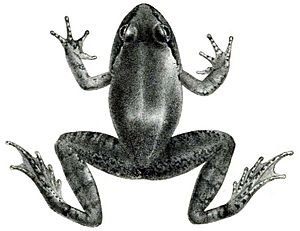Paa vicina facts for kids
Quick facts for kids Paa vicina |
|
|---|---|
 |
|
| Conservation status | |
| Scientific classification | |
| Kingdom: | |
| Phylum: | |
| Class: | |
| Order: | |
| Family: | |
| Genus: |
Paa
|
| Species: |
P. vicina
|
| Binomial name | |
| Paa vicina (Stoliczka, 1872)
|
|
The Paa vicina is a type of frog. It belongs to the family of "true frogs," called Ranidae. This frog species lives in parts of India and Pakistan.
Contents
About the Paa Vicina Frog
The Paa vicina is a fascinating amphibian. It was first described in 1872 by a scientist named Stoliczka. Frogs are known for their jumping ability and their unique life cycle.
Where Paa Vicina Lives
This frog prefers specific kinds of places to live. Its natural homes are usually in areas that are:
- Subtropical or tropical moist mountains: These are warm, wet areas often found on hillsides.
- Subtropical or tropical high-altitude grasslands: These are grassy areas high up in the mountains, still warm but with lots of open space.
- Rivers: The frog needs fresh water to survive.
- Freshwater springs: These are places where clean water comes out of the ground.
These habitats provide the right conditions for the Paa vicina to find food and reproduce.
Why Paa Vicina Needs Our Help
Sadly, the Paa vicina is facing a big problem. It is threatened by something called habitat loss. This means the places where it lives are disappearing.
What is Habitat Loss?
Habitat loss happens when natural environments are destroyed or changed. This can be due to:
- People building new homes or roads.
- Farms expanding into natural areas.
- Pollution making water or land unsafe.
- Changes in climate affecting their environment.
When a frog's habitat is lost, it becomes harder for them to find food, shelter, and places to lay their eggs. This can lead to fewer frogs over time.
Conservation Status
The Paa vicina is currently listed as "Least Concern" (LC) by the IUCN (International Union for Conservation of Nature). This means it is not immediately in danger of disappearing. However, the threat of habitat loss is still a concern for its future. Protecting its natural homes is important to make sure these frogs can continue to thrive.
See also
 In Spanish: Nanorana vicina para niños
In Spanish: Nanorana vicina para niños
 | Emma Amos |
 | Edward Mitchell Bannister |
 | Larry D. Alexander |
 | Ernie Barnes |


